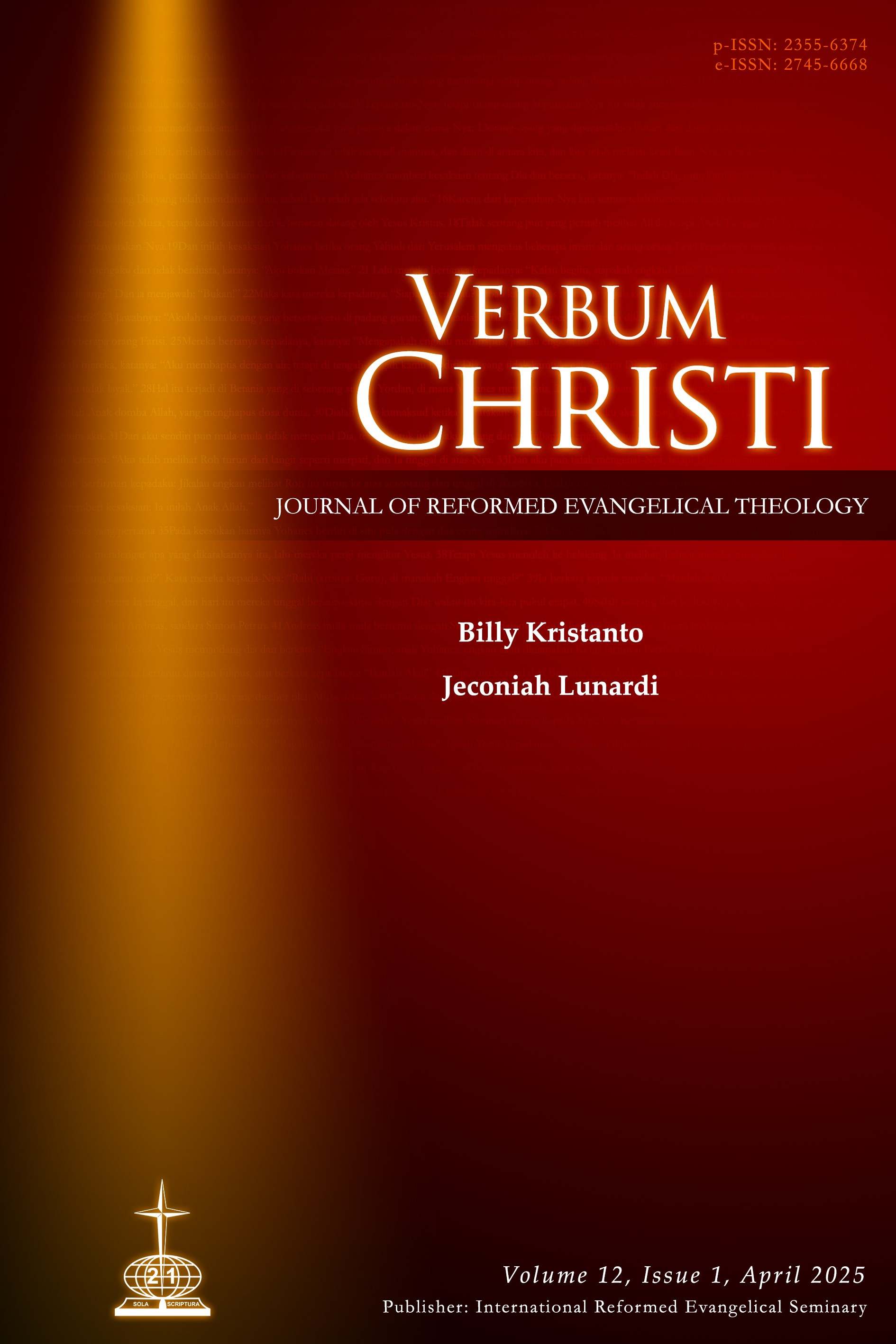Interaksi Intelektual dan Kehendak dalam Pandangan John Calvin
Membangun Jembatan Antara Filsafat Pendidikan Calvin dan Freire
DOI:
https://doi.org/10.51688/VC12.1.2025.art3Kata Kunci:
intelektual, kehendak, pendidikan kritis, transformasi sosial, kesadaran kritisAbstrak
Artikel ini mengeksplorasi interaksi antara intelektual dan kehendak dalam pendidikan menurut pemikiran John Calvin, serta relevansinya dengan pendidikan kritis Paulo Freire. Calvin menekankan pentingnya keseimbangan antara intelektual dan kehendak dalam pencarian kebenaran. Penekanan tersebut sejalan dengan prinsip Freire yang mendorong siswa untuk berpikir kritis dan reflektif. Proses kontemplasi dalam pemikiran Calvin—yang memungkinkan individu merenungkan pengetahuan untuk memengaruhi kehendak—mencerminkan pendekatan reflektif yang diusung Freire dalam pendidikan kritis. Selain itu, keduanya menekankan kebebasan dalam pengambilan keputusan dan individu harus bertindak berdasarkan pengetahuan yang benar dan nilai-nilai moral. Pemikiran Calvin juga menyoroti pentingnya transformasi sosial, sejalan dengan visi Freire untuk menciptakan individu yang tidak hanya cerdas secara intelektual, tetapi juga memiliki komitmen moral untuk memperbaiki masyarakat. Dengan menggunakan metode analisis dokumen, hasil dari penelitian ini menunjukkan bahwa pemikiran Calvin dan Freire saling melengkapi dalam membentuk kerangka pendidikan yang kritis dan berorientasi pada perubahan sosial.
Unduhan
Referensi
Calvin, John. Commentary on Matthew, Mark, Luke - Volume 1. Christian Classics Ethereal Library: Grand Rapids, 1509-1564. https://www.ccel.org/ccel/calvin/calcom31.ix.ix.html.
_____. The Bondage and Liberation of the Will: A Defence of the Orthodox Doctrine of Human Choice Against Pighius (Texts and Studies in Reformation and Post-Reformation Thought). Grand Rapids: Baker Academic, 2002.
_____. The Institutes of the Christian Religion. Diterjemahkan oleh Henry Beveridge. Michigan: Grand Rapids, 2008.
Frame, John M. A History of Western Philosophy and Theology. Phillipsburg: P&R Publishing, 2015.
Freire, Paulo. Pedagogy of the Oppressed (50th anniversary edition). Diterjemahkan oleh Myra Bergman Ramos. New York: Bloomsbury Academic, 2018.
Helm, Paul. John Calvin’s Ideas. Oxford: Oxford University Press, 2005. https://doi.org/10.1093/0199255695.001.0001.
Ho, Yann-Ru, dan Wei-Chieh Tseng. “Power to the people: Education for social change in the philosophies of Paulo Freire and Mozi.” Educational Philosophy and Theory 54, no. 13 (2022): 2180–91. https://doi.org/10.1080/00131857.2022.2040484.
Ji, Yeonjung. “A Methodological Exploration of Document Analysis as a Qualitative Research Method.” Korean Association for Qualitative Inquiry 10, no. 3 (2024): 25-56. https://doi.org/10.30940/JQI.2024.10.3.25.
Knijnik, Jorge. “To Freire or not to Freire: Educational freedom and the populist right‐wing ‘Escola Sem Partido’ movement in Brazil.” British Educational Research Journal 47, no. 2 (2021): 355–71. https://doi.org/10.1002/berj.3667.
Magee, Arran, dan Tejendra Pherali. “Paulo Freire and critical consciousness in conflict-affected contexts.” Education and Conflict Review 2 (2019): 44–48. https://discovery.ucl.ac.uk/id/eprint/10081479/1/Paulo%20Freire%20and%20critical%20consciousness%20in%20conflict-affected%20contexts.pdf.
Margolf, Diane C. “The French Wars of Religion.” Dalam John Calvin in Context, disunting oleh R. Ward Holder, 50–58. Cambridge: Cambridge University Press, 2019. https://doi.org/10.1017/9781108687447.007.
Marshall, Paul. “Calvin, Society, and Social Change.” Societas Dei: Jurnal Agama dan Masyarakat 1, no. 1 (2014): 76. https://doi.org/10.33550/sd.v1i1.48.
Matthias Freudenberg. “Economic and social ethics in the work of John Calvin.” HTS Teologiese Studies/Theological Studies 65, no. 1 (2009): 634–40. https://hts.org.za/index.php/hts/article/view/286/649.
Muller, Richard A. Divine Will and Human Choice: Freedom, Contingency, and Necessity in Early Modern Reformed Thought. Grand Rapids: Baker Academic, 2017.
Pangaribuan, Rinto Fransiscus. “Kritik Teologis dari Perspektif John Calvin terhadap Pemikiran Walter Lippmann tentang Neoliberalisme.” Societas Dei: Jurnal Agama dan Masyarakat 10, no. 1 (2023): 23–54. https://doi.org/10.33550/sd.v10i1.346.
Singleton, Mokhele Johannes, dan Lazarus Donald Mokula Lebeloane. “The Influence of Calvinism on South Africa’s Education System Prior to 1994.” Studia’, Historiae Ecclesiasticae XXXV, no. 2 (2009): 141–52.
Sosler, Alex. “With No Will, There Is No Way: John Calvin on Education.” Christian Education Journal: Research on Educational Ministry 20, no. 1 (2023): 87–103. https://doi.org/10.1177/07398913231178842.
Theodore Beza. The Life of John Calvin. Philadelphia: J. Whetam, 1836.
Tulung, Jeane Marie, dan Yornan Masinamboue. “Pemikiran Teologis Edukatif Yohanes Calvin Serta Relevansinya Bagi Pendidikan Bergereja Masa Kini.” Tumou Tou 7, no. 1 (2020): 11–26, https://ejournal-iakn-manado.ac.id/index.php/tumoutou/article/view/154/164.
Vlastuin, Willem van. “Calvin’s human being: Intellect and will in Calvin.” In Die Skriflig / In Luce Verbi 57, no. 1 (2023): 1-8. https://doi.org/10.4102/ids.v57i1.2890.
Zachman, Randall C. John Calvin as Teacher, Pastor, and Theologian: The Shape of His Writings and Thought. Grand Rapids: Baker Academic, 2006.
Unduhan
Diterbitkan
Cara Mengutip
Terbitan
Bagian
Lisensi
Artikel ini mengikuti ketentuan Creative Commons Attribution-NonCommercial 4.0 International License.
Hak Cipta (c) 2025 Verbum Christi: Jurnal Teologi Reformed Injili. Hak tersebut dipegang jurnal dengan sepengetahuan penulis.

